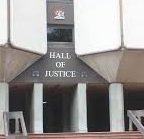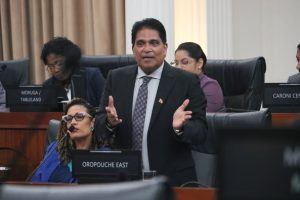By Alicia Chamely
THE Judiciary is defending its use of police stations stating that the only trials that take place in police stations are virtual trials, which have had no effect on the efficiency of law enforcement.
The Judiciary issued an official response via media release to statements made at last week’s post Cabinet media briefing by both Minister of Justice Devesh Maharaj and Homeland Security Minister Roger Alexander that police stations were cramped for space due to it being used as a courthouse.
The Judiciary stated, “The Judiciary’s policy in criminal matters is that charged persons appear the same day virtually and without the need to be transported to a courthouse. This arrangement does not convert police stations into courtrooms – it just puts the accused in front of a computer for a virtual appearance.”
Regarding efficiency, the Judiciary reported, “Feedback from many of the Court’s customers has been excellent. However, the Court continues to enhance its services to better serve the public—making it more convenient; enabling judges, masters, magistrates, and attorneys to hear matters involving witnesses in various locations (including overseas); and reducing the significant cost to the Public Purse of transporting prisoners for every hearing adjournment.”
The Judiciary expressed hopes to meet with both ministers to address the issue and work together in enhancing the court system in Trinidad and Tobago and revert to a slower system by eliminating virtual hearings.
“The Judiciary would not like to revert to a lower and slower level of activity caused by the inability to have virtual hearings, or to the high expenditure required by having to transport all accused persons for each and every appearance or adjournment,” the release stated.
At the post Cabinet meeting, Alexander and said the use by the Judiciary, interfered with the efficiency of both the police service and the justice system.
Alexander said he had been receiving mass complaints by both members of the police service and the public about a number of police stations being occupied by the court.
He said this had caused great inconvenience and stress to both the public and law enforcement officers.
Alexander said, “I am responsible for providing all resources available for law enforcement to have them up and running and this came in at a time when persons are occupying, the court is occupying places of importance in the station. Take for instance the identification room, the interview room and places like that, which is very critical for investigations by police officers.”
He said to best tackle the issue he had liaised with Maharaj to formulate a solution.
Alexander said, “I want the law enforcement officers to understand that we are working on it, and we hope to get a result at the shortest possible time.”
Maharaj said in addressing the issue he had two concerns.
Firstly, were “unconfirmed” reports that certain trails were being held at police stations, which he said they were investigating.
Secondly, was the delay of infrastructural projects being done by the judiciary.
Maharaj said, “We have received an interim report from the judiciary identifying more than ten to twelve projects. Most of them, if not all, are behind schedule, and they are going to look at it critically to deal with the issue.”
Both ministers also agreed for the justice system to work efficiently, proper infrastructure needed to be put in place and they were working on finding solutions in the shortest time possible.
![]()













